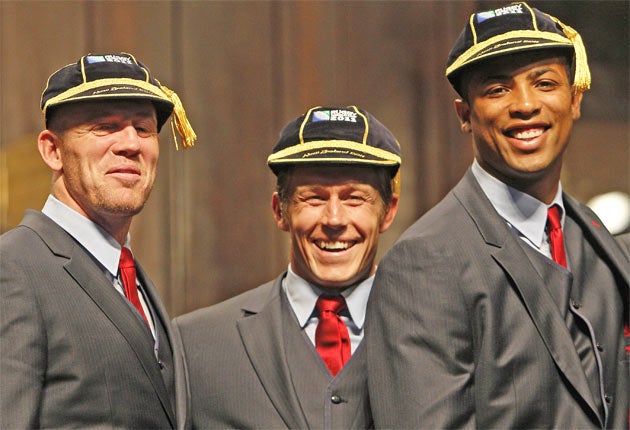Playing indoors puts the wind up Wilkinson
England No 10 says kicking will be harder under new stadium roof in opening match against Argentina

In theory, it should be comparatively easy: no wind, no rain, a controlled environment offering complete protection from the unexpected... the decision of the good folk of Otago to pension off the weather-beaten hellhole that was Carisbrook and invest in a beautiful new arena boasting a transparent roof among its many modern conveniences surely plays into the hands – or rather, the feet – of Jonny Wilkinson? Yet if this weekend's opening World Cup pool match between England and Argentina boils down to a shoot-out from the kicking tee, the most celebrated marksman in the history of red-rose rugby will be just a little edgy.
"The fact that there are no outside variables is a variable in itself," the outside-half explained. "The percentages are so small when you're playing rugby indoors, the tiny things matter more than ever: the temperature in the stadium, the degree of condensation, the air volume, the size of the crowd... it all affects the flight of the ball." Life beneath the super-light, self-cleaning polymer will not quite be as straightforward as people imagine, then? Wilkinson blinked, then shook his head. "Christ, it's never simple," he replied.
Then there is the small matter of the ball itself. At the last World Cup in France four years ago, Wilkinson was unfamiliar with, and profoundly underwhelmed by, the particular model foisted on him by the tournament organisers. "No one likes change when it comes to operating under pressure," he said, admitting to an outbreak of "grumpiness" during that weird and wonderful tournament. "But ultimately, the kickers have no choice. It's a matter of remembering the old saying about dominating the ball before it dominates you and getting on with business."
This is Wilkinson's fourth global competition, and as in the previous three, he will work hand in glove with Dave Alred – one of the fixed points in his ever-changing world. Alred's relationship with the high-and-mighties at the Rugby Football Union has not always been a model of trust and understanding – he tends not to trust them; they do not even begin to understand him – but where Jonny-boy goes, he follows. "Dave's the best, and always will be," Wilkinson insisted. "Why? Because after all these years, he still wants to be better."
As recently as last autumn, Alred's precise place in the England hierarchy was uncertain: his relationship with Wilkinson was as close as ever, but he was not a fully fledged, publicly acknowledged member of Martin Johnson's staff. There is nothing mysterious about his position now. In the team's official tournament literature, he has a page to himself, as do Johnson and the four specialist coaches who have been with the manager from day one of his tenure: John Wells, Graham Rowntree, Brian Smith and Mike Ford. The message is clear. Alred is back in the thick of it.
According to Wilkinson, the teacher-pupil partnership remains daisy-like in its freshness. "It's not so much the technical aspect as the mental one," he explained. "I've been doing this a long time – my first Test here in Dunedin was back in 1998, which seems like a lifetime ago – and sometimes I think: 'I should have got it by now.' But when I wake up in the morning, I'm a different person to the one who went to sleep. You never know it all, so the work never finishes. There's always something new to learn."
Johnson, increasingly fond of naming his starting XV at the last possible minute, will not say a word on matters selectorial until tomorrow, but there is no obvious reason to suppose that Wilkinson will not start the game against the South Americans. He can therefore expect to come face to face with someone rather familiar: Felipe Contepomi, alongside whom he played at Toulon last season.
"I've sat in the crowd and watched Felipe kick, I've watched him from the bench, I've stood on the field during a game and watched him," Wilkinson said. "Often, it's seemed like he can't miss. He's shown me things about rugby I consider to be invaluable." It was quite a eulogy, but then, Contepomi is quite a player. It should be a fascinating contest.
Not, of course, as fascinating as the contest up front. At least, not in Rowntree's book. The scrummaging coach was in his element yesterday, waxing lyrical about the rugged beauty of a set-piece battle involving two of the world's premier grunt-and-groan units. "The Pumas have a scrummaging tradition that commands respect," he said. "I remember playing them myself. Those matches were always hard – all blood, sweat and tears. You test yourself against the Pumas the way you do against the French, because these people are the benchmark when it comes to scrummaging. And when you have Argentine forwards playing their club rugby in France, as most of these blokes do, it doubles the challenge."
Join our commenting forum
Join thought-provoking conversations, follow other Independent readers and see their replies
Comments
Bookmark popover
Removed from bookmarks